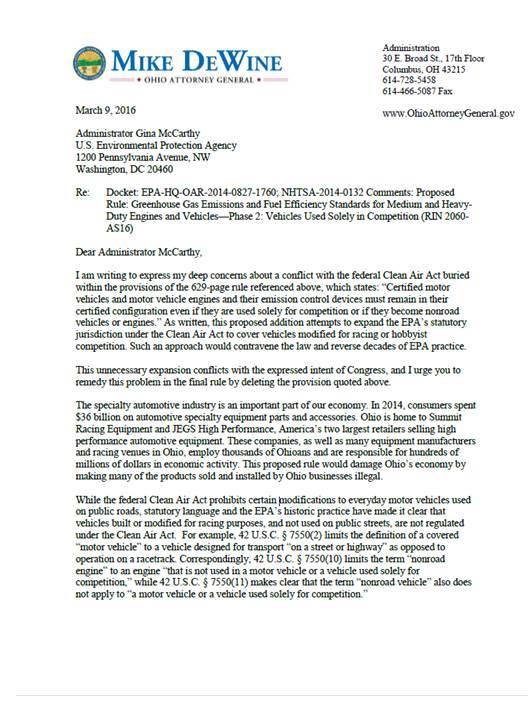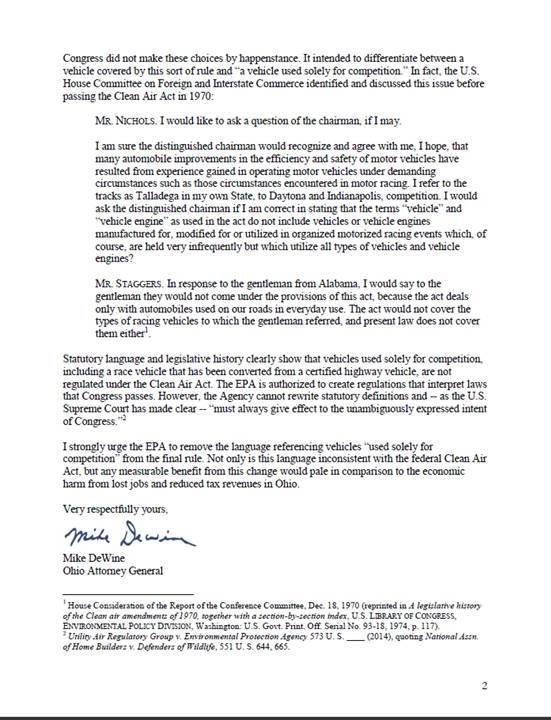Ohio is a drag racing hotbed. The state is home to many aftermarket equipment manufacturers, several drag racing venues, and the world’s largest distributor of aftermarket parts: Summit Racing.
It’s no wonder Ohio Attorney General Mike DeWine is strongly opposed to the latest EPA proposal to prohibit the conversion of street vehicles into dedicated race cars. DeWine recently joined the growing opposition to the proposal, sending a letter to the EPA to express his concerns. In the letter, DeWine says the new regulation alters the original intent of the Clean Air Act, which was not meant to apply to vehicles used solely for competition. The letter also states that the proposal would damage the national economy, which saw consumers spend $36 billion on automotive specialty parts and accessories, and that of Ohio, home to thousands of employees in the specialty automotive industry.
Click the link or images below to read DeWine’s entire letter.
(page 1)
RMD Comments to EPA on race cars 3.9.2016
(page 2)
Below is the content of DeWine’s letter:
Administrator Gina McCarthy
U.S. Environmental Protection Agency
1200 Pennsylvania Avenue, NW
Washington, DC 20460Re: Docket: EPA-HQ-OAR-2014-0827-1760; NHTSA-2014-0132 Comments: Proposed Rule: Greenhouse Gas Emissions and Fuel Efficiency Standards for Medium and Heavy-Duty Engines and Vehicles—Phase 2: Vehicles Used Solely in Competition (RIN 2060-AS16)
Dear Administrator McCarthy,
I am writing to express my deep concerns about a conflict with the federal Clean Air Act buried within the provisions of the 629-page rule referenced above, which states: “Certified motor vehicles and motor vehicle engines and their emission control devices must remain in their certified configuration even if they are used solely for competition or if they become nonroad vehicles or engines.” As written, this proposed addition attempts to expand the EPA’s statutory jurisdiction under the Clean Air Act to cover vehicles modified for racing or hobbyist competition. Such an approach would contravene the law and reverse decades of EPA practice.
This unnecessary expansion conflicts with the expressed intent of Congress, and I urge you to remedy this problem in the final rule by deleting the provision quoted above.
The specialty automotive industry is an important part of our economy. In 2014, consumers spent $36 billion on automotive specialty equipment parts and accessories. Ohio is home to Summit Racing Equipment and JEGS High Performance, America’s two largest retailers selling high performance automotive equipment. These companies, as well as many equipment manufacturers and racing venues in Ohio, employ thousands of Ohioans and are responsible for hundreds of millions of dollars in economic activity. This proposed rule would damage Ohio’s economy by making many of the products sold and installed by Ohio businesses illegal.
While the federal Clean Air Act prohibits certain modifications to everyday motor vehicles used on public roads, statutory language and the EPA’s historic practice have made it clear that vehicles built or modified for racing purposes, and not used on public streets, are not regulated under the Clean Air Act. For example, 42 U.S.C. § 7550(2) limits the definition of a covered “motor vehicle” to a vehicle designed for transport “on a street or highway” as opposed to operation on a racetrack. Correspondingly, 42 U.S.C. § 7550(10) limits the term “nonroad engine” to an engine “that is not used in a motor vehicle or a vehicle used solely for competition,” while 42 U.S.C. § 7550(11) makes clear that the term “nonroad vehicle” also does not apply to “a motor vehicle or a vehicle used solely for competition.”
Congress did not make these choices by happenstance. It intended to differentiate between a vehicle covered by this sort of rule and “a vehicle used solely for competition.” In fact, the U.S. House Committee on Foreign and Interstate Commerce identified and discussed this issue before passing the Clean Air Act in 1970:
MR. NICHOLS. I would like to ask a question of the chairman, if I may.
I am sure the distinguished chairman would recognize and agree with me, I hope, that many automobile improvements in the efficiency and safety of motor vehicles have resulted from experience gained in operating motor vehicles under demanding circumstances such as those circumstances encountered in motor racing. I refer to the tracks as Talladega in my own State, to Daytona and Indianapolis, competition. I would ask the distinguished chairman if I am correct in stating that the terms “vehicle” and “vehicle engine” as used in the act do not include vehicles or vehicle engines manufactured for, modified for or utilized in organized motorized racing events which, of course, are held very infrequently but which utilize all types of vehicles and vehicle engines?
MR. STAGGERS. In response to the gentleman from Alabama, I would say to the gentleman they would not come under the provisions of this act, because the act deals only with automobiles used on our roads in everyday use. The act would not cover the types of racing vehicles to which the gentleman referred, and present law does not cover them either.
Statutory language and legislative history clearly show that vehicles used solely for competition, including a race vehicle that has been converted from a certified highway vehicle, are not regulated under the Clean Air Act. The EPA is authorized to create regulations that interpret laws that Congress passes. However, the Agency cannot rewrite statutory definitions and — as the U.S. Supreme Court has made clear — “must always give effect to the unambiguously expressed intent of Congress.”
I strongly urge the EPA to remove the language referencing vehicles “used solely for competition” from the final rule. Not only is this language inconsistent with the federal Clean Air Act, but any measurable benefit from this change would pale in comparison to the economic harm from lost jobs and reduced tax revenues in Ohio.
Very respectfully yours,
Mike DeWine
Ohio Attorney General



Comments